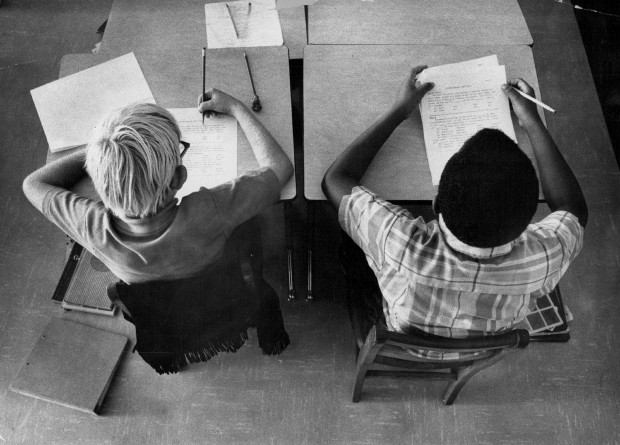60 Years After Brown, Reflections On Desegregation In Florida
Brown v. Board of Education—the Supreme Court decision declaring segregated schools are inherently unequal—turns 60 years old this weekend.
Earlier this week, we brought you memories from students and teachers who were there in the early days of desegregation.
And now, with decades of perspective, here are some of their reflections on the legacy of Brown:
Mamie Pinder
In 1963, Mamie Pinder was a first-time classroom teacher in the previously all-white Allapattah Elementary School. She taught fourth grade. Eventually, Pinder went on to be the first black woman to run for mayor of Miami.
“One day I spent the time asking each of my kids—who were black and white now—‘What color are you? What color are you?’ You get pink, brown, blue. Any color. You don’t get black or white from kids.
The kids are taught—it’s a true saying—in the home. Home is the first school of education. What that child is taught in the home is what that child brings into the world. And then once you bring it into the world, that kid has to make a decision what part of the world they want.”
Retha Boone-Fye
Today, Retha Boone-Fye is the executive director of Miami-Dade’s Black Affairs Advisory Board. A Miami native, she grew up in Liberty City and graduated from Miami Jackson Senior High in 1968. When she started eighth grade at Miami Jackson, she was one of just a couple dozen black students.
“The legacy was supposed to be equal educational opportunity. But unfortunately that has not happened, because you still have poor people who have poor schools. You still have issues where equal education is not across the board. I wish that it were so. We may be getting better. But that, to me, the legacy has not been borne out.
I’m a pessimist from the standpoint of I think that we could do better. But I’m an optimist in the hopes that we will. The kids today don’t quite understand the struggle their parents had to go through. And I think that’s a good and a bad thing. The good part about is that they don’t have that background to hold them back. The bad part is they don’t remember to appreciate it in the end. Maybe that’s good and bad.”
Ellen Elias
Ellen Elias teaches Brown v. Board of Education in her AP government class at Dr. Michael Krop Senior High. In 1971 she had black classmates for the first time when she started attending JFK Junior High.
“I think part of it made me into the kind of person I am in terms of how I treat other people—also certainly how I parent my child. She went to JFK Middle School. Instead of sticking with the little Highland Oaks crowd, she went to school with almost all black kids. And at her Bat Mitzvah, it was a rainbow of faces. I think that’s kind of cool that she’s much more exposed to people who are different from her.
When I [teach] the Supreme Court cases, each student presents a different case. We talk about the impacts of those cases and then we look around the room and we’re like, ‘you wouldn’t be here if Brown v. Board of Education hadn’t passed.’ There’s another case—Title IX, women in sports—and I have amazing female athletes in my classes. So we always look at the impact. And the students are very aware of whose shoulders they’re standing on.”
You can hear these Floridians talking about what it was like to integrate. Note to listeners: this story contains strong language.
